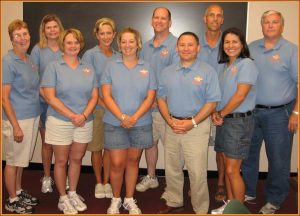Enriching Earth Science in Rural Tennessee Middle Schools through Research-based Activities on Climate and Environmental History

The objective of this Track I GK–12 project is to bring the excitement of research to rural middle schools in east Tennessee, by linking Earth science instruction with ongoing and new University research on climate and environmental history as reconstructed from natural Earth archives including sediments, soils, tree rings, rocks, and fossils. Graduate students in the Departments of Earth and Planetary Sciences and of Geography who are studying such records of Earth history will serve as GK–12 fellows in 7 schools in 4 districts. Fellows, teachers, and faculty advisors will work together to develop research-based science activities, and new collaborative local research with students, that build on the research of fellows, advisors, and others, and that link to national and state curriculum standards. GK–12 partnerships will be strengthened through workshops, through collaboration in research and in the development and implementation of research-based learning activities, and through professional development activities including summer lab internships and field work opportunities for teachers.
The intellectual merit of this project derives from the effort to link University Earth science research and middle school teaching through innovative, research-based activities and authentic, collaborative research involving fellows, teachers, and students. Within the geosciences there is significant interest in fostering K–12 research partnerships through which students can be involved in authentic and open-ended research, but we need more models and more tests of their efficacy. The project will develop and test a new model for geoscience research partnerships that involves advanced graduate students, University faculty, teachers, and middle school students.
The broader impacts of this project include increased school and community attention to Earth science and improved understanding of the nature of science and of research. GK–12 Fellows will improve their teaching and communication skills, and gain experience forming successful partnerships with a diversity of people. GK–12 Teachers will be provided with resources to increase their STEM (science, technology, engineering, mathematics) knowledge and enrich STEM instruction. The University of Tennessee will diversify its graduate STEM instruction, and both the University and Middle Schools will strengthen partnerships of mutual benefit. Middle Schools will enrich science programs through new activities and professional development of their science teachers. Middle School Students will increase their knowledge of the Earth sciences, of scientific research, of careers in science, and of educational paths to those careers. Efforts are expected to also increase student and parental interest in middle school science, and student enjoyment of science; they may also increase student interest in entering STEM careers. University Faculty participating in the GK-12 project will gain experience linking research and K–12 education, and in advising graduate students doing the same, and will improve their ability to communicate science to diverse audiences.